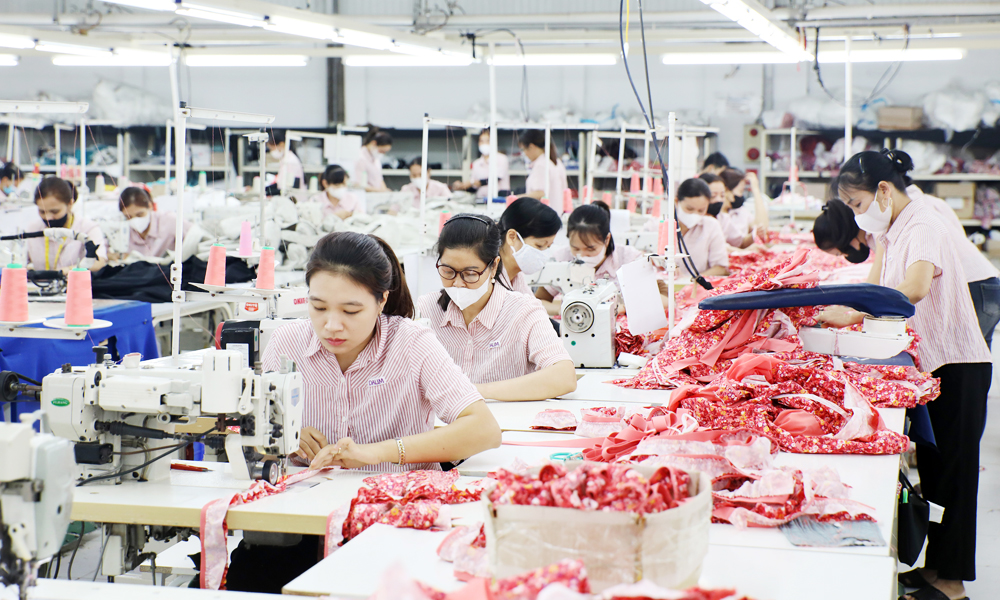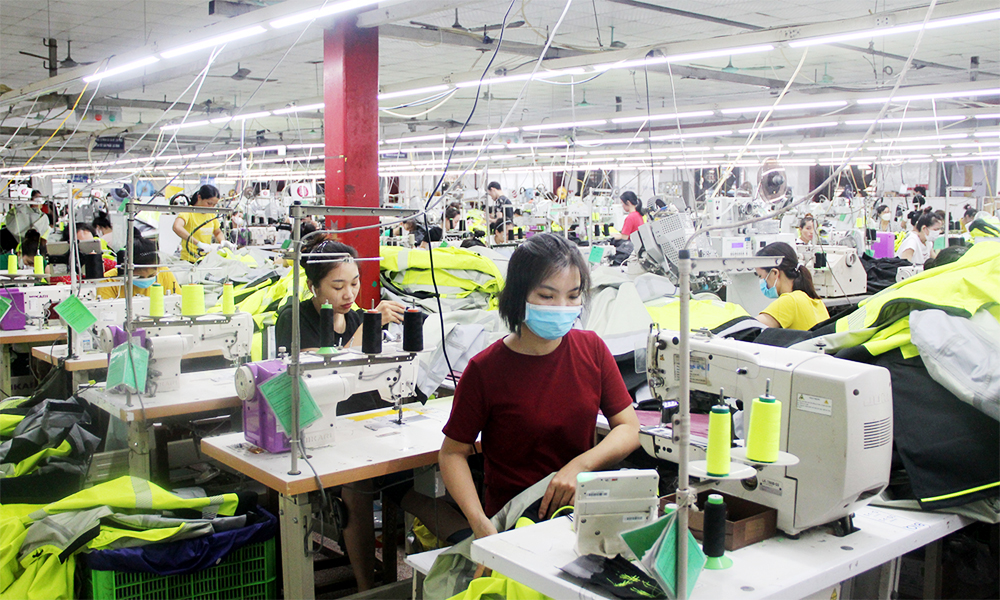Bac Giang’s enterprises focus on retaining workers amidst labor market competition
BAC GIANG - Amid fierce labor market competition, businesses across the northern province of Bac Giang are not only enhancing recruitment packages but also continuously improving employee benefits to retain their workforce. It is widely acknowledged that fair compensation and proper welfare policies encourage workers to stay committed and contribute to sustainable business growth.
Stable income, fair benefits
Operating since December 2017, Daum&QQ Vietnam Co., Ltd. (Hiep Hoa district), a wholly South Korean-owned garment exporter, currently employs nearly 300 workers. To meet expanding production demands, the company is seeking to recruit 100 new laborers, with the average monthly income now reaching 11 million VND (477 USD) per person.
 |
|
The production line at Daum&QQ Vietnam Company Limited. |
Dinh Thi Anh Ngoc, Production Manager, said in addition to an annually adjusted base salary (currently over 4.4 million VND per month), workers are offered various allowances, including 500,000 VND for transportation, 500,000 VND for attendance, 100,000 VND for seniority, and 400,000 VND for productivity. The company also provides meal allowances of 25,000 VND per shift and for those working overtime until 8 PM, an extra meal worth 15,000 VND.
Longtime employee Hoang Thi Nga shared "Beyond wages and bonuses, the company cares deeply about our well-being, offering support during illnesses or personal hardships." Notably, when Nga was diagnosed with cervical cancer, the company and its trade union raised nearly 20 million VND in 2024 to help ease her family’s burden.
Similarly, Daeyang Hanoi Co., Ltd in Dong Dinh Industrial Cluster (Tan Yen District) has long been recognized by the provincial Labor Federation as a “Worker-Friendly Enterprise” thanks to its efforts in employee welfare. Given the nature of assembling electronic components, the company allows a 10-minute break every 3 hours for day shifts and 20 minutes for night shifts.
Special arrangements are also made for its predominantly female workforce (accounting for 70%), including lighter tasks for pregnant employees from their fifth month onward and flexible meal breaks for those nursing infants.
Creating a workplace where employees want to stay
Bac Giang currently hosts around 10,000 active enterprises, including 508 in industrial parks, employing more than 342,600 laborers — an increase of over 35,800 compared to the same period last year. Demand is expected to surge further in 2025, with roughly 120,000 new hires projected, including 30,000 in second quarter.
| Bac Giang currently hosts around 10,000 active enterprises, including 508 in industrial parks, employing more than 342,600 laborers — an increase of over 35,800 compared to the same period last year. Demand is expected to surge further in 2025, with roughly 120,000 new hires projected, including 30,000 in second quarter. |
As labor shortages loom, many companies are proactively reviewing and improving their policies to enhance wages, adjust working hours, boost allowances for attendance, longevity and productivity together with offering financial support for transportation and housing. These steps help foster a sense of security and loyalty among employees.
Enterprises offering competitive benefits typically see minimal turnover. For instance, during the Covid-19 pandemic's "three-on-the-spot" production model in 2021, nearly 200 workers — 60% of the stable workforce — quickly volunteered to stay on-site at Nano Hightech Co., Ltd in Song Khe - Noi Hoang Industrial Park, helping the company maintain operations despite challenging conditions.
Luxshare-ICT Co., Ltd., one of the province's largest employers with approximately 44,500 workers, reported a very low turnover rate. According to HR Director Do Quan, the few who do leave are usually new hires who feel unsuited to the work.
To attract and retain staff, the company raised its base salary from 5.1 million VND to 5.5 million VND per month starting March 1, 2025, bringing the average income for workers to between 9-12 million VND monthly.
According to Tran Van Ha, Deputy Director of the Department of Home Affairs, fostering harmonious, stable and progressive labor relations is the most effective long-term strategy for minimizing labor disputes and strikes.
It also serves as a benchmark for assessing corporate social responsibility and business reputation. To this end, companies must continuously improve employee welfare, recognizing that human resources are their most valuable asset.
In the future, the department will coordinate with unions and local authorities to step up labor law enforcement, promote outstanding worker-friendly business models and ensure fair practices across the province.
 Bắc giang
Bắc giang











Reader's comments (0)